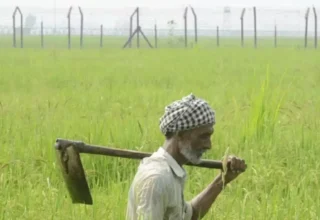ISLAMABAD, Oct 7 (ABC): Due to recent devastating flash floods and torrential rains across the cotton producing areas of Sindh, Punjab, Balochistan, Khyber Pakhtunkhwa, the overall cotton output of major cash crop is likely to remain between 7 to 8 million bales as against the set targets of 10.5 million bales during current season. According to initial estimates, out of the total cultivated area, cotton crop standing over 20-25 percent damaged and destroyed due to floods, which resulted in decline in output as against the set targets, said Economic Adviser in the Ministry of National Food Security and Research, and Vice President Pakistan Central Cotton Committee (PCCC) Dr Muhammad Ali Talpur.
He said that the actual picture would surface after receiving inputs from relevant stakeholders in the meeting of Cotton Crop Assessment Committee (CCAC), which is scheduled to be held after completing the damage assessment survey of flood affected districts across the crop producing areas. Initially, he said that the Sindh Province had reported that 100 percent crop destroyed due to floods, however, the province had harvested about 800,000 to 900,000 cotton bales before the starting of devastation. He said that cotton crop was also damaged in two main crop producing districts of Punjab including Rajanpur and Dara Ghazi Khan.
Dr Talpur further informed that standing crop in some districts of Baluchistan were also damaged, adding that cotton was damaged in Dera Ismail Khan District of Khyber Pakhtunkhwa. He said efforts were afoot to revive and restore productivity of this crop of economic importance. We are paying special focus to ensure availability of certified hybrid seeds of cotton in order to enhance per-acre crop output to quality crop as according to international standards for ensuring maximum rate of returns to local farmers for there produces, he added. To this effect, the Ministry of National Food Security and Research was negotiating for seeds technology transfer with three international companies developing cotton seeds of double and triple genes, adding that these companies were asked to transfer technology and develop the Germplasm according to local ecology.
In order to revive cotton crop, he said that special events were also organized on World Cotton Day at different institutes including Pakistan Central Cotton Committee Multan and progressive farmers were invited to share their experiences and develop the stall of their produces. The event is being organized at other institutes including Sakrand and Ghotki, which aimed at educating the local farming communities about modern crop management practices to enhance per-acre crop production to achieve sustainable agriculture growth.
























